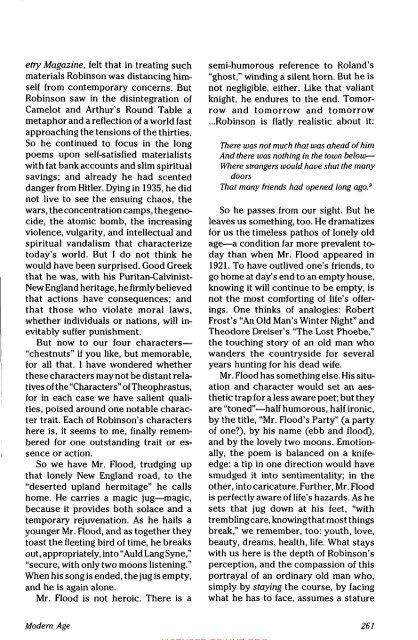Edwin Arlington Robinson: Tilbury Town Revisited
Edwin Arlington Robinson: Tilbury Town Revisited
Edwin Arlington Robinson: Tilbury Town Revisited
Create successful ePaper yourself
Turn your PDF publications into a flip-book with our unique Google optimized e-Paper software.
etry Magazine, felt that in treating such<br />
materials <strong>Robinson</strong> was distancing him-<br />
self from contemporary concerns. But<br />
<strong>Robinson</strong> saw in the disintegration of<br />
Camelot and Arthur’s Round Table a<br />
metaphor and a reflection of a world fast<br />
approaching the tensions of the thirties.<br />
So he continued to focus in the long<br />
poems upon self-satisfied materialists<br />
with fat bank accounts and slim spiritual<br />
savings; and already he had scented<br />
danger from Hitler. Dying in 1935, he did<br />
not live to see the ensuing chaos, the<br />
wars, theconcentration camps, thegeno-<br />
cide, the atomic bomb, the increasing<br />
violence, vulgarity, and intellectual and<br />
spiritual vandalism that characterize<br />
today’s world. But I do not think he<br />
would have been surprised. Good Greek<br />
that he was, with his Puritan-Calvinist-<br />
New England heritage, he firmly believed<br />
that actions have consequences; and<br />
that those who violate moral laws,<br />
whether individuals or nations, will in-<br />
evitably suffer punishment.<br />
But now to our four characters-<br />
“chestnuts” if you like, but memorable,<br />
for all that. I have wondered whether<br />
these characters may not be distant rela-<br />
tives of the“Characters”of Theophrastus,<br />
for in each case we have salient quali-<br />
ties, poised around one notable charac-<br />
ter trait. Each of <strong>Robinson</strong>’s characters<br />
here is, it seems to me, finally remem-<br />
bered for one outstanding trait or es-<br />
sence or action.<br />
So we have Mr. Flood, trudging up<br />
that lonely New England road, to the<br />
“deserted upland hermitage” he calls<br />
home. He carries a magic jug-magic,<br />
because it provides both solace and a<br />
temporary rejuvenation. As he hails a<br />
younger Mr. Flood, and as together they<br />
toast the fleeting bird of time, he breaks<br />
out, appropriately, into “Auld Lang Syne,”<br />
“secure, with only two moons listening.”<br />
When his song is ended, the jug is empty,<br />
and he is again alone.<br />
Mr. Flood is not heroic. There is a<br />
semi-humorous reference to Roland’s<br />
“ghost,” winding a silent horn. But he is<br />
not negligible, either. Like that valiant<br />
knight, he endures to the end. Tomor-<br />
row and tomorrow and tomorrow<br />
... <strong>Robinson</strong> is flatly realistic about it:<br />
There was not much that was ahead of him<br />
And there was nothing in the town below-<br />
Where strangers would have shut the many<br />
doors<br />
That many Friends had opened long<br />
So he passes from our sight. But he<br />
leaves us something, too. He dramatizes<br />
for us the timeless pathos of lonely old<br />
age-a condition far more prevalent to-<br />
day than when Mr. Flood appeared in<br />
1921. To have outlived one’s friends, to<br />
go home at day’s end to an empty house,<br />
knowing it will continue to be empty, is<br />
not the most comforting of life’s offer-<br />
ings. One thinks of analogies: Robert<br />
Frost’s “An Old Man’s Winter Night” and<br />
Theodore Dreiser’s “The Lost Phoebe,”<br />
the touching story of an old man who<br />
wanders the countryside for several<br />
years hunting for his dead wife.<br />
Mr. Flood has something else. His situ-<br />
ation and character would set an aes-<br />
thetic trap for aless aware poet; but they<br />
are “toned”-half humorous, half ironic,<br />
by the title, “Mr. Flood’s Party” (a party<br />
of one?), by his name (ebb and flood),<br />
and by the lovely two moons. Emotion-<br />
ally, the poem is balanced on a knife-<br />
edge: a tip in one direction would have<br />
smudged it into sentimentality; in the<br />
other, into caricature. Further, Mr. Flood<br />
is perfectly aware of life’s hazards. As he<br />
sets that jug down at his feet, “with<br />
tremblingcare, knowing that most things<br />
break,” we remember, too: youth, love,<br />
beauty, dreams, health, life. What stays<br />
with us here is the depth of <strong>Robinson</strong>’s<br />
perception, and the compassion of this<br />
portrayal of an ordinary old man who,<br />
simply by staying the course, by facing<br />
what he has to face, assumes a stature<br />
Modern Age 261
















